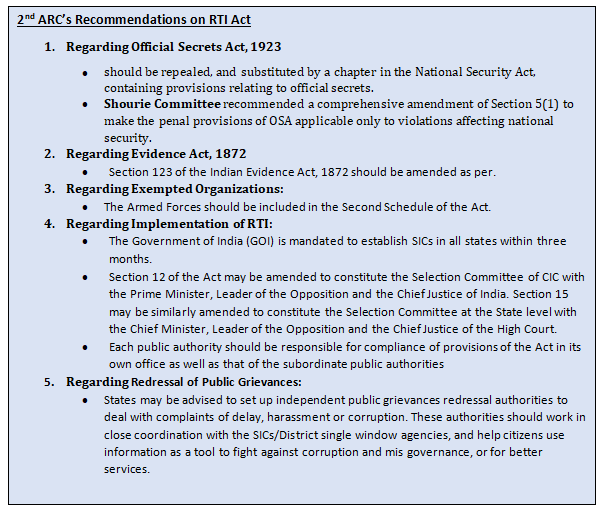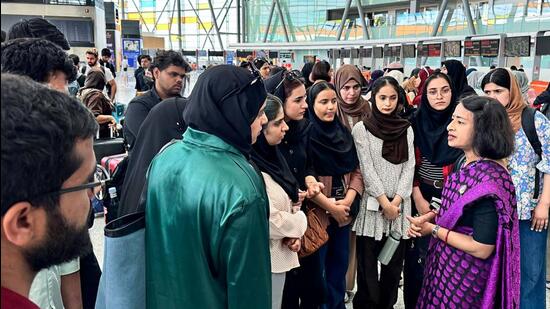- Courses
- GS Full Course 1 Year
- GS Full Course 2 Year
- GS Full Course 3 Year
- GS Full Course Till Selection
- Answer Alpha: Mains 2025 Mentorship
- MEP (Mains Enrichment Programme) Data, Facts
- Essay Target – 150+ Marks
- Online Program
- GS Recorded Course
- Polity
- Geography
- Economy
- Ancient, Medieval and Art & Culture AMAC
- Modern India, Post Independence & World History
- Environment
- Governance
- Science & Technology
- International Relations and Internal Security
- Disaster Management
- Ethics
- NCERT Current Affairs
- Indian Society and Social Issue
- NCERT- Science and Technology
- NCERT - Geography
- NCERT - Ancient History
- NCERT- World History
- NCERT Modern History
- CSAT
- 5 LAYERED ARJUNA Mentorship
- Public Administration Optional
- ABOUT US
- OUR TOPPERS
- TEST SERIES
- FREE STUDY MATERIAL
- VIDEOS
- CONTACT US
Information Commissions in India
Information Commissions in India
16-10-2023

Why in News?
Recently, NGO Satark Nagrik Sangathan's report on the performance of Information Commissions in India under the Right to Information Act, 2005 reveals Maharashtra as the worst performing state in RTI responsiveness with 1,15,524 pending appeals.
- SNS is an NGO that promotes transparency and accountability, empowering citizens to become vigilant and informed participants in democracy.

Key Highlights of the Report Card
- Status in 2023: The backlog of 3,21,537 appeals and complaints in 27 State Information Commissions across the country is steadily increasing.
- Previous Status: The 2019 assessment revealed a surge in appeals/complaints in 26 Information Commissions, reaching 2,86,325 in 2021 and reaching three Lakh in 2022.
-
Dormant Information Commissions:
- The four Information Commissions - Jharkhand, Telangana, Mizoram, and Tripura - are currently inactive due to the absence of new Information Commissioners upon incumbents' departure.
- Six Information Commissions, including the Central Information Commission and the State Information Commissions of Manipur, Chhattisgarh, Maharashtra, Bihar, and Punjab, are currently headless.
-
Disposal Rate:
- The West Bengal State Information Commission (SIC) is the worst performing in disposal rate, taking an estimated 24 years and one month to dispose of a matter.
- The time it takes for SICs in Chhattisgarh and Maharashtra to process an appeal or complaint is over four years, with 10 Information Commissions taking over a year.

Right to Information Act
-
Origin:
- The Right to Information (RTI) law was established in 1986 through the Supreme Court's ruling in Mr. Kulwal v/s Jaipur Municipal Corporation case.
- The RTI Act replaced the Freedom of Information Act 2002.
- About: The Right to Information (RTI) is a legislative act that outlines the rules and procedures for citizens' right to information.
- Objective: The act aimed to expedite government services by allowing citizens to inquire about delays in applications or official proceedings.
- Time Limit: Under the provisions of RTI Act, any citizen of India may request information from a “public authority” (a body of Government or “instrumentality of State”) which is required to reply expeditiously or within 30.
Governing of RTI
The Right to information in India is governed by two major bodies:
- Central Information Commission (CIC) B. State Information Commissions (SIC)
-
Central Information Commission (CIC):
- Origin: The Central Government established the CIC in 2005 under the Right to Information Act (2005), but it is not a constitutional body.
- Composition: The Commission consists of a Chief Information Commissioner and not more than ten Information Commissioners.
- Appointment: The President appoints officials based on a committee comprising the Prime Minister as Chairperson, the Lok Sabha Leader of Opposition, and a Union Cabinet Minister nominated by the Prime Minister.
- Tenure: The Chief Information Commissioner and Information Commissioner serve as prescribed terms by the Central Government or until age 65, with no reappointment eligibility under the 2019 RTI Act.
-
Power and Functions of CIC:
-
- The Commission is tasked with receiving and investigating complaints regarding information requested under RTI, 2005.
- The Commission has the power to initiate an inquiry into any matter if there are reasonable grounds for such an inquiry.
- The Commission has the authority to summon and require documents during inquiries, akin to a civil court.
-
State Information Commission (SIC):
-
- Composition: The Commission comprises a State Chief Information Commissioner and ten State Information Commissioners.
- Appointment: The Governor appoints officials based on committee recommendations, including the Chairperson, Opposition Leader, and state Cabinet Minister nominated by the CM.
- Tenure: The terms of service are comparable to those of CIC.
-
Challenges in RTI Act, 2005
- Information explosion: Information seeking often lacks public interest and can misuse the law, potentially harassing public authorities by requesting desperate and voluminous information.
- Deliberate Misuse: Some chauvinists use RTI as a tool for publicity and vindictive harassment, pressuring already burdened public authorities.
- Rising cases of non-disclosure: The Indian Evidence Act and the Official Secrets Act, 1923 both contain provisions that restrict the disclosure of documents.
- Limited scope of RTI: The CJI's office is now under the RTI's jurisdiction, but the CBI is exempt.
- Misuse against Whistleblowers: RTI activists face increasing intimidation, threats, and murders, with no safeguards in place to protect those who report such incidents.
- Subjected to restrictions: The Right to Information (RTI) is a fundamental aspect of the right to freedom of speech, but it can be restricted under Article 19 (2).
- Contempt of court: Any information that is explicitly prohibited by any court of law or tribunal or may constitute contempt of court under the Contempt of Court Act, 1971, cannot be released.

Way Forward
- Speedy disposal: The backlog of cases is worsened by reduced capacity of most Commissions, necessitating the government to expedite the appointment of chiefs and IC members.
- Prioritization of cases: Prioritizing cases related to life and liberty, such as food distribution, social security, and health, requires proactive disclosure of such information.
- Digitalization: Governments should establish an online filing system for RTI applications and consolidate all authorities under a single platform.
- Reducing technicalities: The RTI application filing process in rural India needs to be simplified due to the low literacy rate, making it difficult for them to comply with the procedural requirements.
- Protecting whistleblowers: The bill aims to protect whistleblowers from easy attacks, requiring immediate passage or supplementary strict measures.

Conclusion
According to 2nd ARC RTI is one of the most important legislation for good governance since independence. Hence, in order to implement the act in letter and spirit it must be amended as per the recommendations of 2nd ARC. Also, it must be adopted by Sate governments with an intention to augment Transparency in Administration and Governance.



